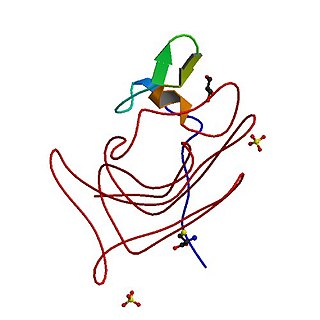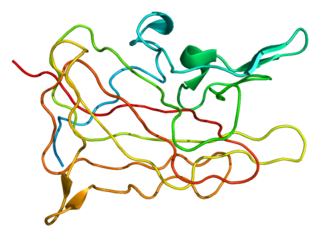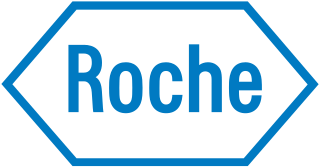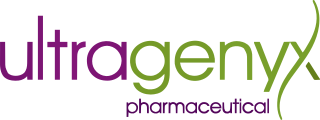
Gene therapy is a medical technology that aims to produce a therapeutic effect through the manipulation of gene expression or through altering the biological properties of living cells.

Haemophilia, or hemophilia, is a mostly inherited genetic disorder that impairs the body's ability to make blood clots, a process needed to stop bleeding. This results in people bleeding for a longer time after an injury, easy bruising, and an increased risk of bleeding inside joints or the brain. Those with a mild case of the disease may have symptoms only after an accident or during surgery. Bleeding into a joint can result in permanent damage while bleeding in the brain can result in long term headaches, seizures, or a decreased level of consciousness.

Haemophilia A is a blood clotting disorder caused by a genetic deficiency in clotting factor VIII, thereby resulting in significant susceptibility to bleeding, both internally and externally. This condition occurs almost exclusively in males born to carrier mothers due to X-linked recessive inheritance. Nevertheless, rare isolated cases do emerge from de novo (spontaneous) mutations.

Haemophilia B, also spelled hemophilia B, is a blood clotting disorder causing easy bruising and bleeding due to an inherited mutation of the gene for factor IX, and resulting in a deficiency of factor IX. It is less common than factor VIII deficiency.

Biogen Inc. is an American multinational biotechnology company based in Cambridge, Massachusetts, United States specializing in the discovery, development, and delivery of therapies for the treatment of neurological diseases to patients worldwide. Biogen operates in Argentina, Brazil, Canada, China, France, Germany, Hungary, India, Italy, Japan, Mexico, Netherlands, Poland, Sweden, and Switzerland.

F. Hoffmann-La Roche AG, commonly known as Roche, is a Swiss multinational healthcare company that operates worldwide under two divisions: Pharmaceuticals and Diagnostics. Its holding company, Roche Holding AG, has shares listed on the SIX Swiss Exchange. The company headquarters are located in Basel. Roche is the fifth-largest pharmaceutical company in the world by revenue and the leading provider of cancer treatments globally.
Virotherapy is a treatment using biotechnology to convert viruses into therapeutic agents by reprogramming viruses to treat diseases. There are three main branches of virotherapy: anti-cancer oncolytic viruses, viral vectors for gene therapy and viral immunotherapy. These branches use three different types of treatment methods: gene overexpression, gene knockout, and suicide gene delivery. Gene overexpression adds genetic sequences that compensate for low to zero levels of needed gene expression. Gene knockout uses RNA methods to silence or reduce expression of disease-causing genes. Suicide gene delivery introduces genetic sequences that induce an apoptotic response in cells, usually to kill cancerous growths. In a slightly different context, virotherapy can also refer more broadly to the use of viruses to treat certain medical conditions by killing pathogens.
Leber congenital amaurosis (LCA) is a rare inherited eye disease that appears at birth or in the first few months of life.

Choroideremia is a rare, X-linked recessive form of hereditary retinal degeneration that affects roughly 1 in 50,000 males. The disease causes a gradual loss of vision, starting with childhood night blindness, followed by peripheral vision loss and progressing to loss of central vision later in life. Progression continues throughout the individual's life, but both the rate of change and the degree of visual loss are variable among those affected, even within the same family.
Retinal gene therapy holds a promise in treating different forms of non-inherited and inherited blindness.
Emicizumab, sold under the brand name Hemlibra, is a humanized bispecific monoclonal antibody for the treatment of haemophilia A, developed by Genentech and Chugai. A Phase I clinical trial found that it was well tolerated by healthy subjects.
Katherine A. High is an American doctor-scientist who is an emeritus professor at the Perelman School of Medicine at the University of Pennsylvania. She was the co-founder, president, and chief scientific officer of Spark Therapeutics and currently serves as President of Therapeutics at AskBio. Her career has focused on pioneering work in the area of gene therapy, with many accomplishments in basic, translational, and clinical investigation in gene therapy.
Voretigene neparvovec, sold under the brand name Luxturna, is a gene therapy medication for the treatment of Leber congenital amaurosis.

Sangamo Therapeutics, Inc. is an American biotechnology company based in Brisbane, California. It applies cell and gene therapy to combat haemophilia and other genetic diseases.

Congenital blindness refers to blindness present at birth. Congenital blindness is sometimes used interchangeably with "Childhood Blindness." However, current literature has various definitions of both terms. Childhood blindness encompasses multiple diseases and conditions present in ages up to 16 years old, which can result in permanent blindness or severe visual impairment over time. Congenital blindness is a hereditary disease and can be treated by gene therapy. Visual loss in children or infants can occur either at the prenatal stage or postnatal stage. There are multiple possible causes of congenital blindness. In general, 60% of congenital blindness cases are contributed from prenatal stage and 40% are contributed from inherited disease. However, most of the congenital blindness cases show that it can be avoidable or preventable with early treatment.

Ultragenyx is an American biopharmaceutical company involved in the research and development of novel products for treatment of rare and ultra-rare genetic diseases for which there are typically no approved treatments and high unmet medical need. The company works with multiple drug modalities including biologics, small molecule, gene therapies, and ASO and mRNAs in the disease categories of bone, endocrine, metabolic, muscle and CNS diseases.
Valoctocogene roxaparvovec, sold under the brand name Roctavian, is a gene therapy used for the treatment of hemophilia A. It was developed by BioMarin Pharmaceutical. Valoctocogene roxaparvovec is made of a virus (AAV5) that has been modified to contain the gene for factor VIII, which is lacking in people with hemophilia A. It is an adeno-associated virus vector-based gene therapy. It is given by intravenous infusion.
Fidanacogene elaparvovec, also known as SPK-9001 is an experimental gene therapy delivered via adeno-associated virus developed for Hemophilia B; it partially restores factor IX production in preliminary studies.
Dirloctogene samoparvovec, also known as SPK-8011, is an experimental gene therapy developed for hemophilia A by Roche and Spark Therapeutics.










